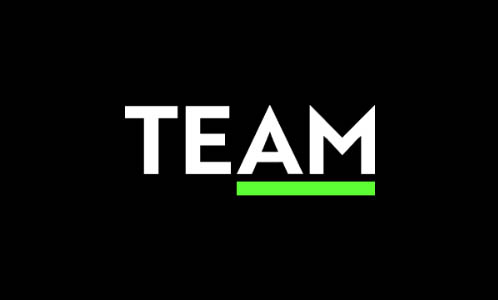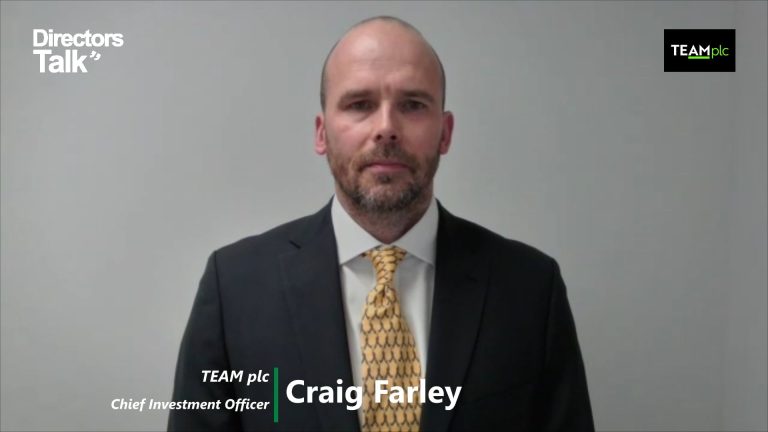TEAM Plc (LON:TEAM) Executive Chairman Mark Clubb caught up with DirectorsTalk to discuss the launch of their UCITS fund and outlines strong interim results, strategic growth in global advisor recruitment, and future opportunities in the wealth management sector.
Q1: Mark, you’ve just launched the Team UCITS Fund. Could you tell us more about the fund, why it’s important, and how it fits into your wider growth strategy?
A1: I think we’ve been talking about the fund launch for a while, and I did actually refer to it in the statements, so I’m really pleased.
As of the end of last week, the fund range has been launched and it’s central to our growth, really, because what it does is it gives our own advisors, so advisors in NEBA Private Clients, NEBA Wealth, and Concentric, access to investment management capabilities. But importantly, because our advisory businesses are open architecture when it comes to platforms, the funds will sit on multiple platforms across the world. So, everything from Morningstar to Arden to Utmost to Pershing etc.
That’s the good news in terms of the funds being a portal, if you like, to take some of that AUA down into AUM but at the end of the day, it’s about our clients, and this UCITS structure gives very compelling cost benefits to the clients, because the total expense ratios or overall costs are extremely competitive. And particularly for regular savers or regular contributors into retirement planning or just regular savings planning, where you might be putting as little as $100 a month in, this is a very efficient and cost-effective way for you to save or prepare for your retirement.
Just to summarise, we’ve got three strategies. They replicate our existing discretionary portfolio strategies, so cautious, balanced and growth. They’re all multi-asset portfolios going to be available, they are available in GBP, Euros and US dollars.
So, really, really pleased.
Q2: Now you’ve also published your interim results for the first half of the year, showing strong revenue growth and improved EBITDA. What have been the key drivers of the performance and what are the financial highlights that you’d point to?
A2: Hopefully, our shareholders in the market are starting to get used to the fact that our growth is going to come from the growth in our advisory business, and the growth in the advisory business is about recruitment. So, for example, 13 new advisors joined between January and March this year. At the beginning of January, we had two people in South Africa, by the end of August, we’ll have eight. So, that’s not included in those 13.
A good example would be three new advisors joined in Jersey at the beginning of the year; they’ve been particularly impactful because a good percentage of their clients have migrated over to us.
I would also comment that our advisors more broadly, including the whole Jersey team, has and continues to perform well. I think that our brands are getting better known, becoming a recognisable, trusted brand and this is also very much helped by what is at the core of it all, which is the investment management performance, which has had yet another period of good performance returns. That has helped assets under management grow and actually a part that we don’t talk about much, which is notably the segregated mandates.
So, launch of the UCITS fund, continued recruitment of advisors, that’s the key to the future growth of the group.
We now have a very clearly differentiated offer to potential advisors looking to join us. It’s attractive, particularly because of the NEBA five-year buyout agreement, which gives advisors the full benefit of a PLC-backed platform, all of our global licences, a verified, proven, high integrity investment process but they keep autonomy and future value. So, we have a strapline for people joining us under that five-year buyout agreement: What you grow, you keep.
In terms of financial highlights, a billion is not a bad number in terms of assets under advice. I think revenue is up 25% is pretty satisfactory and perhaps more satisfactory is the yield on the investment management business, which is up 12.7%.
Not only have we been growing the business, but we also had a bit of a spring clean out, literally spring, in that we decided we needed to look at our cost base. We have substantially brought our annualised costs down by towards £700,000 and we have identified a further £165,000 of cost savings, a lot of which has already been put in place. We continue to reduce our burn rate and profitability, as I sometimes put it in previous interviews and publications, escape velocity is very close in sight on a month-on-month basis.
Q3: You mentioned earlier that TEAM has made significant progress internationally with the addition of 13 new advisors in the first quarter. What’s driving advisor growth and how does international expansion fit into your longer-term vision?
A3: So, I did a bit of desktop research and was looking at Certified Financial Planners, that’s the qualification that most of them look to have, and if you exclude jurisdictions where TEAM has no regulated presence, so US, Canada, UK, there’s over 230,000 individuals who hold that Certified Financial Planner certificate. We’ve got just a bit less than 100 so some of those 230,000 will be working for banks or big insurance companies, but certainly not 230,000 so that is the opportunity, frankly.
Sometimes people ask me, well, when do you mature and there are a heck of a lot of these people out there. Then when you look at trying to do some desktop work in terms of the number of regulated independent advisory companies across Asia, Africa, Middle East, there’s tens of thousands of them.
So, let’s work it backwards. A typical mid-tier advisor tends to have something like 125/135 clients, probably around about 90 of which will be active, and each client will have something like $750,000 to $1 million, so that’s our market. That pool of talent, if you like, is very wide and dispersed across many regions, we have an advisor in Bali, for example but what is happening as we get bigger, and we get more brand recognition, and being a PLC listed on the London Stock Exchange helps, we are now attracting experienced individuals from this pool.
They’re doing so really because they’re confident that their clients will follow them, they’re joining something that they can point their clients to www.teamplc.co.uk, and our structure, more importantly, enables them to earn more, whilst also providing a broader, better, and more bespoke service to their clients.
So why can they earn more? They can earn more because they may be situated in Ho Chi Minh City, this is a real case, Danny, in Ho Chi Minh City and 80% of his clients don’t live in Vietnam, they’re all over the world. So, he can have clients in other jurisdictions where the client is a client of a NEBA business regulated in whatever that jurisdiction is, let’s say it’s the Emirates and the client onboards into those T&Cs.
So, we can have 200 additional advisors, which would be towards £3 billion of additional assets under advice and we haven’t even made a dent in the market.
So, we stick with our medium-term target of annual revenues of £20 million, EBITDA margin of 30%, and assets under advice/management of £4 billion.
Q4: Does the current environment for investors help or hinder the TEAM platform, do you think?
A4: I get asked this a lot. Am I seeing an avalanche of clients coming in from the UK, for example? I suppose it’s great marketing. The current government is great for us in terms of marketing, every day the front page of the newspapers has got something to do with changes in tax, migration of wealth, difficult to quantify, though, for us.
What I can tell you is that in our international markets, the regulatory authorities are catching up in terms of starting to homogenise around a higher benchmark, whether that be European and MiFID, or whether it’s the FCA, or whether it’s the Jersey Financial Services Commission, regulators are catching up. This is helping because it is driving independent advisors into looking for homes in well-regulated entities.
So, what we say is that we are a professional home for serious advisors who want to build, grow, and eventually exit on their own terms. What you grow is what you keep, and as we’ve just been through, there are many such advisors out there, that’s where our growth will come from.
I don’t know about the current trend of wealthy Brits looking to migrate, whether for work or retirement, I don’t know. I read somewhere that the UK is projected to lose approximately 16,500 high-net-worth individuals this year alone which is the highest number of any country worldwide. What I can tell you is those that are leaving are going to jurisdictions where TEAM, through our subsidiaries, mainly NEBA, have regulated and approved offices and presence, and I guess that has to be an unquantifiable tailwind.
Q5: Just looking ahead for the second half of 2025, what should stakeholders be watching for?
A5: Shareholders and/or our people, I think, can look for two different things.
I think our shareholders can look for the same again, more of the same. We continue to look at costs. I think as a shareholder, pay particular attention to the fund flow into our UCITS range and the recruitment growth in particularly the two NEBA businesses, the international side.
Within our employee base, look for more colleagues, look for more scale, look for more efficiencies. We’re going to make your life easier.
We’ve got a number of interesting initiatives that will be both revenue and cost accretive. My only uncertainty is whether or not we can get these through into the second half, but they will certainly be there to benefit us in the first half of next year.







































